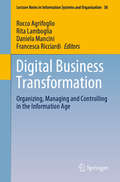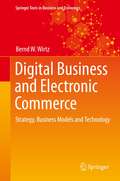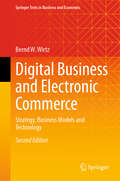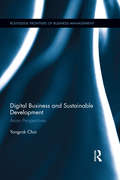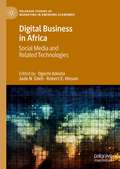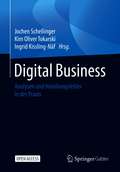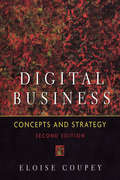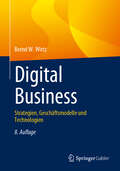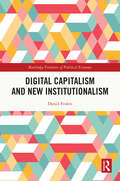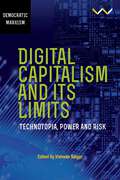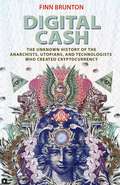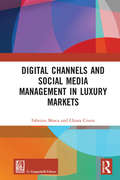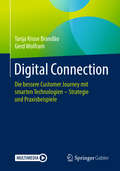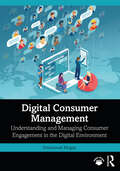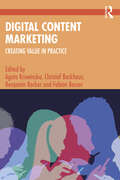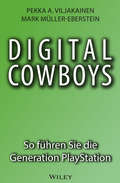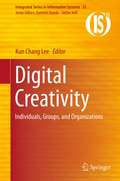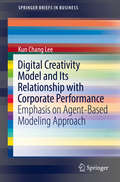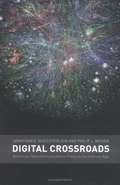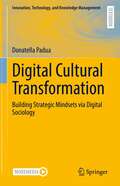- Table View
- List View
Digital Business Transformation: Organizing, Managing and Controlling in the Information Age (Lecture Notes in Information Systems and Organisation #38)
by Francesca Ricciardi Rocco Agrifoglio Daniela Mancini Rita LambogliaThe recent surge of interest in “digital transformation” is changing the business landscape and posing several challenges, both organizational and sectoral. This transformation involves the application of digital technology in all aspects of business, and enables organizations to create new products and services, and to find more efficient ways of doing business.Moreover, the digital transformation is happening within and across organizations of all types and in every industry, producing a disruptive innovation that can break down the barriers between people and organizations, and help create more adaptive processes. In the information age, it is imperative for organizations to develop IT-related capabilities that allow them to leverage the potential of digital technologies. Due to the pervasive effects of this transformation on processes, firms and industries, both scholars and practitioners are interested in better understanding the key mechanisms behind the emergence and evolution of the digital business transformation.This book presents a collection of research papers focusing on the relationships between technologies (e.g., digital platforms, AI, blockchain, etc.), processes (e.g., decision-making, co-creation, financial, compliance, etc.), and organizations (e.g., smart organizations, digital ecosystems, Industry 4.0, collaborative networked organizations, etc.), which have been categorized into three major areas: organizing, managing and controlling. It also provides critical insights into how the digital transformation is enhancing organizational processes and firms’ performance through an exploration and exploitation of internal resources, and through the establishment of external connections and linkages. The plurality of views offered makes this book particularly relevant for users, companies, scientists, and governments. The content of the book is based on a selection of the best papers (original double-blind peer-reviewed contributions) presented at the annual conference of the Italian chapter of the AIS, which was held in Naples, Italy in September 2019.
Digital Business and Electronic Commerce: Strategy, Business Models and Technology (Springer Texts in Business and Economics)
by Bernd W. WirtzThis textbook introduces readers to digital business from a management standpoint. It provides an overview of the foundations of digital business with basics, activities and success factors, and an analytical view on user behavior. Dedicated chapters on mobile and social media present fundamental aspects, discuss applications and address key success factors. The Internet of Things (IoT) is subsequently introduced in the context of big data, cloud computing and connecting technologies, with a focus on industry 4.0, smart business services, smart homes and digital consumer applications, as well as artificial intelligence. The book then turns to digital business models in the B2C (business-to-consumer) and B2B (business-to-business) sectors. Building on the business model concepts, the book addresses digital business strategy, discussing the strategic digital business environment and digital business value activity systems (dVASs), as well as strategy development in the context of digital business. Special chapters explore the implications of strategy for digital marketing and digital procurement. Lastly, the book discusses the fundamentals of digital business technologies and security, and provides an outline of digital business implementation. A comprehensive case study on Google/Alphabet, explaining Google's organizational history, its integrated business model and its market environment, rounds out the book.
Digital Business and Electronic Commerce: Strategy, Business Models and Technology (Springer Texts in Business and Economics)
by Bernd W. WirtzThis textbook introduces readers to digital business from a management standpoint. It provides an overview of the foundations of digital business with basics, activities and success factors, and an analytical view on user behavior. Dedicated chapters on mobile and social media present fundamental aspects, discuss applications and address key success factors. The Internet of Things (IoT) is subsequently introduced in the context of big data, cloud computing and connecting technologies, with a focus on industry 4.0 and the industrial metaverse. In addition, areas such as smart business services, smart homes and digital consumer applications as well as artificial intelligence, quantum computing and automation based on artificial intelligence will be analysed. The book then turns to digital business models in the B2C (business-to-consumer) and B2B (business-to-business) sectors.Building on the business model concepts, the book addresses digital business strategy, discussingthe strategic digital business environment and digital business value activity systems (dVASs), as well as strategy development in the context of digital business. Special chapters explore the implications of strategy for digital marketing and digital procurement. Lastly, the book discusses the fundamentals of digital business technologies and security, and provides an outline of digital business implementation. A comprehensive case study on Google/Alphabet, explaining Google's organizational history, its integrated business model and its market environment, rounds out the book.
Digital Business and Sustainable Development: Asian Perspectives (Routledge Frontiers of Business Management)
by Yongrok ChoiThe Internet has ushered in a new era in the economies of networking. With the increasing need for optimization based on these network economies, the IT-based e-business has become a platform for study as well as daily practice. In a similar vein, global warming has raised many issues which come into conflict with traditional research and policies. The Internet revolution has also shifted our society from a government- and company-led economy to a ‘netizen’- and consumer-led business world. This book enlightens us on why a harmonized participation of traditional network members or interested groups is necessary and how we can create values from diverse fields of interests and objectives, including the corporate social responsibility (CSR) and eco-friendly productivity. Digital Business and Sustainable Development integrates the platforms from these two fields of study based on the comparative analysis of Asian and other developing countries.
Digital Business in Africa: Social Media and Related Technologies (Palgrave Studies of Marketing in Emerging Economies)
by Ogechi Adeola Robert E. Hinson Jude N. EdehThis edited volume seeks to examine how enterprises in Africa can utilize digital technologies and innovations in creating value for their customers and clients in order to increase effectiveness and efficiency. Through social media, businesses are increasingly reaching and engaging their customers in several ways and so enterprises in Africa must harness the opportunities in the digital space if they want to remain competitive, earn profit, and meet their customers’ needs. Accordingly, this book looks at how digital technologies are helping shape the financial, educational, and advertising sectors in Africa. As digital technologies raise challenges, the chapters that follow will discuss ethical and social practical frameworks to effective digital business in Africa. This volume promises to fore both theoretical underpinnings, and practical implementations of digital technologies in the African business context.
Digital Business: Analysen und Handlungsfelder in der Praxis
by Kim Oliver Tokarski Jochen Schellinger Ingrid Kissling-NäfDieses Open-Access-Fachbuch beleuchtet empirische und theoretische Aspekte der Digitalisierung der Wirtschaft aus der Perspektive verschiedener Managementbereiche. Der Megatrend Digitalisierung ist zu einem dominierenden Einflussfaktor für die Entwicklung der Unternehmen geworden. In zunehmendem Maße werden nicht nur die Strategien der Unternehmen digitaler, sondern sämtliche Führungs- und Handlungsfelder im Digital Business. Das Buch behandelt vor diesem Hintergrund aktuelle, praxisrelevante Fragestellungen zu allgemeinen Rahmensetzungen und Technologien des Digital Business, zum Finanzmanagement, Human Resource Management, Produktionsmanagement und zum Marketing. Alle Beiträge wurden durch bewährte Autorenteams erarbeitet. Diese setzen sich in der Regel aus Lehrenden und Forschenden der Berner Fachhochschule und Vertreterinnen und Vertretern der Unternehmenspraxis mit akademischem Background zusammen. Die Beiträge basieren auf empirischen Analysen, die zumeist ihren Schwerpunkt auf Gestaltungsprobleme aus der Unternehmenspraxis legen. Hieraus ergibt sich ein breites Spektrum an konkreten Fallbeispielen.
Digital Business: Concepts and strategies
by Eloise CoupeyAs businesses adapt to the realities of the digital world and build on the hard-won insights of the digital business pioneers, increasing importance is placed on the need to understand how traditional concepts of business strategy and implementation are influenced by the Internet, and to identify the novel aspects of business that are made possible by the Internet. That is why this book was written. How do you succeed in the digital business environment? How do you make the transition from offline to online? What aspects of your business will be affected, and how should you manage them? Digital Business: Concepts and Strategies will help you develop the skills necessary to understand and integrate Internet technology and characteristics into business activity for attaining strategic objectives.
Digital Business: Strategien, Geschäftsmodelle und Technologien
by Bernd W. WirtzDigital Business ist ein wesentlicher Erfolgs- und Wettbewerbsfaktor für Unternehmen. Das Buch behandelt umfassend die Grundlagen, Strategien, Geschäftsmodelle und Entwicklungsmöglichkeiten. Neben operativen Managementthemen werden neu in der 8. Auflage auch die digitale Transformation, die digitale Automatisierung und Robotik, Ansätze der Künstlichen Intelligenz und das Quantum Computing thematisiert.
Digital Business: Strategy, Management & Transformation
by Annmarie HanlonDigital Business: Strategy, Management & Transformation covers all the essentials for understanding and doing business in a digital world within a single comprehensive textbook, including an introduction to the digital business environment, cutting-edge coverage of data and artificial intelligence, and an exploration of the latest digital tools and platforms and emerging and enabling technologies such as blockchain and Web 3.0. The text explores all types and scales of digital business, from small, innovative start-ups and disruptors that are ‘born digital’, to the digital transformation of traditional large-scale businesses. Readers will also learn how these businesses strategise, operate and manage themselves, user experiences and customer relationships within an ever-increasing digital environment. Consideration is also given to the ethical and legal components of doing digital business with the United Nations’ Sustainable Development Goals in mind. This textbook includes a rich source of learning features and activities making it suitable for business students at undergraduate and postgraduate levels, and setting students up for success on graduation in a fast-changing, digitalised and technology-led business world. Annmarie Hanlon teaches digital marketing and is Course Director for the MSc Marketing and Leadership at Cranfield School of Management in the UK. You can follow her updates at twitter.com/annmariehanlon and LinkedIn linkedin.com/in/annmariehanlon
Digital Business: Strategy, Management & Transformation
by Annmarie HanlonDigital Business: Strategy, Management & Transformation covers all the essentials for understanding and doing business in a digital world within a single comprehensive textbook, including an introduction to the digital business environment, cutting-edge coverage of data and artificial intelligence, and an exploration of the latest digital tools and platforms and emerging and enabling technologies such as blockchain and Web 3.0. The text explores all types and scales of digital business, from small, innovative start-ups and disruptors that are ‘born digital’, to the digital transformation of traditional large-scale businesses. Readers will also learn how these businesses strategise, operate and manage themselves, user experiences and customer relationships within an ever-increasing digital environment. Consideration is also given to the ethical and legal components of doing digital business with the United Nations’ Sustainable Development Goals in mind. This textbook includes a rich source of learning features and activities making it suitable for business students at undergraduate and postgraduate levels, and setting students up for success on graduation in a fast-changing, digitalised and technology-led business world. Annmarie Hanlon teaches digital marketing and is Course Director for the MSc Marketing and Leadership at Cranfield School of Management in the UK. You can follow her updates at twitter.com/annmariehanlon and LinkedIn linkedin.com/in/annmariehanlon
Digital Capitalism and New Institutionalism (Routledge Frontiers of Political Economy)
by Daniil FrolovModern institutional economics was created to study the institutions of pre-digital economies and is based on reductionist approaches. But digital capitalism is producing institutions of unprecedented complexity. This book argues therefore that not only the economic institutions themselves but also the theoretical foundations for studying those institutions must now be adapted to digital capitalism. The book focuses on the institutional complexity of digital capitalism, developing an interdisciplinary framework which brings together cutting-edge theoretical approaches from philosophy (first of all, object-oriented ontology), sociology (especially actor-network theory), evolutionary biology, and cognitive science. In particular, the book outlines a new approach to the study of institutional evolution, based on extended evolutionary synthesis – a new paradigm in evolutionary biology, which is now replacing neo-Darwinism. The book develops an enactivist notion of extended cognition and cognitive institutions, rejecting the individualistic and mechanistic understanding of economic rationality in digital environments. The author experiments with new philosophical approaches to investigate institutional complexity, for example, the ideas of the flat ontology and the assemblage theory. The flat ontology approach is applied to the study of human-robot institutions, as well as to thinking about post-anthropocentric institutional design. Assemblage thinking allows for a new (much less idealistic) look at blockchain and smart cities. Blockchain as digital institutional technology is considered in the book not from the viewpoint of minimizing transaction costs (as is customary in the modern institutional economics), but by using the theory of transaction value which focuses on improving the quality of digital transactions. The book includes a wide range of examples ranging from metaverses, cryptocurrencies and big data to robot rules, smart contracts and machine learning algorithms. Written for researchers in institutional economics and other social sciences, this interdisciplinary book is essential reading for anyone interested in the interplay of institutional and digital change.
Digital Capitalism and its Limits: Technotopia, Power and Risk
by Vishwas SatgarThe Fourth Industrial Revolution (4IR) has been described as the next big leap in digital capitalism. Digital technologies such as artificial intelligence, quantum computing, 3D printing and robotisation, we are led to believe, will bring more progress, growth and development while also helping us to resolve the deep and multiple crises the world is in. Billions are being invested in these technologies, accompanied by sharp geopolitical rivalries to secure an edge in the control over them. Volume 8 in the Democratic Marxism series invites readers to think more deeply and critically about digital capitalism and its limits. While most governments in the world, including South Africa, have accepted a techno-nationalist narrative and have deliberated on the risks for the planet and humanity, the volume interrogates the effects and consequences of advances in artificial intelligence and heightened technological innovation and industrialisation on employment, democracy and the climate. Viewing the grand social engineering of 4IR through a Marxist lens, the volume contributors engage critically with the class project of digital monopoly capitalism and its powerful totalitarian tendencies. They question the dangerous technotopian imaginary shaping this digital techno-shift, the implications of algorithmic data extractivism, the securitisation of already weak market democracies, the social consequences of digital learning, lack of regulation, and the power dynamics in the labour process. Anchored in techno-realism, the interdisciplinary perspective captured in this volume puts forward alternatives for democratisation and a just transition to protect human and non-human life.
Digital Capitalism: Networking the Global Market System
by Dan SchillerCyberspace not only exemplifies but spearheads the greater political economy of which it has become such a critical part. The networks that comprise cyberspace were originally created at the behest of government agencies, military contractors, and allied educational institutions. However, over the past generation or so, a growing number of these networks began to serve primarily corporate users. Under the sway of an expansionary market logic, the Internet began a political-economic transition toward what Dan Schiller calls "digital capitalism." Schiller traces these metamorphoses through three critically important and interlinked realms. Parts I and II deal with the overwhelmingly "neoliberal" or market-driven policies that influence and govern the telecommunications system and their empowerment of transnational corporations while at the same time exacerbating exisiting social inequalities. Part III shows how cyberspace offers uniquely supple instruments with which to cultivate and deepen consumerism on a transnational scale, especially among privileged groups. Finally, Part IV shows how digital capitalism has already overtaken education, placing it at the mercy of a proprietary market logic.
Digital Cash: The Unknown History of the Anarchists, Utopians, and Technologists Who Created Cryptocurrency
by Finn BruntonThe fascinating untold story of digital cash and its creators—from experiments in the 1970s to the mania over Bitcoin and other cryptocurrenciesBitcoin may appear to be a revolutionary form of digital cash without precedent or prehistory. In fact, it is only the best-known recent experiment in a long line of similar efforts going back to the 1970s. But the story behind cryptocurrencies like Bitcoin and its blockchain technology has largely been untold—until now. In Digital Cash, Finn Brunton reveals how technological utopians and political radicals created experimental money to bring about their visions of the future: protecting privacy or bringing down governments, preparing for apocalypse or launching a civilization of innovation and abundance that would make its creators immortal.The incredible story of the pioneers of cryptocurrency takes us from autonomous zones on the high seas to the world’s most valuable dump, from bank runs to idea coupons, from time travelers in a San Francisco bar to the pattern securing every twenty-dollar bill, and from marketplaces for dangerous secrets to a tank of frozen heads awaiting revival in the far future. Along the way, Digital Cash explores the hard questions and challenges that these innovators faced: How do we learn to trust and use different kinds of money? What makes digital objects valuable? How does currency prove itself as real to us? What would it take to make a digital equivalent to cash, something that could be created but not forged, exchanged but not copied, and which reveals nothing about its users?Filled with marvelous characters, stories, and ideas, Digital Cash is an engaging and accessible account of the strange origins and remarkable technologies behind today’s cryptocurrency explosion.
Digital Channels and Social Media Management in Luxury Markets (Routledge-Giappichelli Studies in Business and Management)
by Fabrizio Mosca Chiara CiveraIn recent years, luxury goods markets have faced significant changes that have influenced both the dynamics of the competition, as well as their strategies. The principal changes include the following: new geographical market development, such as in the Far East, India, and some parts of Africa (these countries are added to a list of already relevant countries that are involved in luxury goods consumption, such as the Emirates, Russia, and South America); diffusion of new media and new technologies in communication, which is characterized by a high degree of interaction; the evolution of distribution channels is underway – these channels are moving towards new forms of integration that utilize both physical digital channels. This has forced firms to revise their strategies and implement multichannel marketing strategies to continue to operate in increasingly international markets that are characterized by increasingly more demanding and informed consumers. This book will enable readers to gain a clear insight into how the luxury goods market operates and amongst other things, focuses on: recent internet and social media strategies adopted by luxury companies and their brands; how luxury companies manage their communication and distribution channels to compete in the market and the impact of digital marketing on their competition; the main models of direct and indirect distribution in the digital channels; how consumers react to multichannel strategies; trends, social commerce and CSR and how luxury companies react; identifying the different social media strategies for luxury companies.
Digital Chocolate
by Linda A. Hill Alison Berkley WagonfeldTrip Hawkins founded Digital Chocolate in Silicon Valley in 2003 to develop outstanding games for mobile devices. By 2008, the company had expanded its operations into four countries and Digital Chocolate was one of the top developers of soloplayer games for standard mobile phones and iPhones. In 2009, Hawkins was eager for Digital Chocolate to start developing new types of mobile games that could be played by multiple players over a period of time. Hawkins wondered how to guide his company into this new area of social gaming without losing any of the tremendous creative momentum the team had built over the previous years.
Digital Commerce and Delivery: Preparing Food and Retail Value Chains for a 50-50 World
by William R. Kerr Daniel O'Connor Paige Boehmcke Will EnsorIncreasing digitalization of grocery retail and quick commerce reveals insights about managing complex supply chains at scale and shifting revenue streams from product sales to data monetization. How are the roles of retailers changing? What happens if marginal cost goes to zero? How might new models change the grocery value chain? Building on earlier future of commerce themes, this note illustrates the challenges and opportunities of next generation retail trends in the grocery sector, including automated order management, logistics optimization, automated fulfillment centers, and the outlook for the future.
Digital Connection: Die bessere Customer Journey mit smarten Technologien – Strategie und Praxisbeispiele
by Tanja Kruse Brandão Gerd WolframDieses Buch zeigt, was smarte Technologien zu allen Phasen der Customer Journey beitragen und wie sie zu einer besseren User Experience führen können. Proximity-Technologien und mobile Endgeräte verändern schon jetzt ganz deutlich das Kundenverhalten. Und die Kundenerwartungen hinsichtlich kontextabhängiger und individualisierter Information steigen. Der alte Marketingtraum: zur richtigen Zeit, im richtigen Kontext an die richtige Person die passende Information zu senden, ist heute schon machbar. Smarte Technologien verknüpfen physische Objekte mit digitalen Inhalten und machen so das „Internet of Things“ werthaltig. Marken, die diese Chance nicht wahrnehmen, werden morgen um ihre Existenz kämpfen müssen. Die Vielzahl der verfügbaren Technologien und die nur wenig bekannten Praxisbeispiele erschweren noch eine zielführende Umsetzung im Rahmen einer digitalen Marketingstrategie. Mit genau diesem Ziel haben die Autoren diesen Ratgeber für die Praxis geschrieben: als pragmatischen Wegweiser hin zu einer Digital-Connected-Strategie für eine individuelle Customer Journey und effektives Touchpoint-Management. Das Ziel: Exzellenz an jedem Touchpoint!Aus dem InhaltVorstellung smarter Technologien und ihrer Funktionsweisen - von Location-Based (GeoFencing und GPS), NFC und RFID, Augmented Reality und Beacons über Chatbots und Messenger bis hin zu Visible Light Communication (VLC) und Virtual RealityRechtliche Rahmenbedingungen und Handlungsanweisungen, wie eine Digital-Connection-Strategie umgesetzt werden kannZahlreiche Praxisbeispiele aus unterschiedlichen BranchenDie AutorenTanja Kruse Brandão ist Digital Business Enabler, Gründerin, Partner der Digital Connection und Leiterin des BVDW-Labs „Proximity Solutions“.Dr. Gerd Wolfram ist CEO von IoT Innovation & Consult, Partner der Digital Connection und renommierter Vordenker zum Thema Digital Innovation.Digitales Buch: mit der kostenlosen Springer Nature ExploreBooks App Videos zum Buch streamen.
Digital Consumer Management: Understanding and Managing Consumer Engagement in the Digital Environment
by Emmanuel MogajiIntegrating consumer behaviour, digital marketing, digital platform management, web analytics, and marketing insights, Digital Consumer Management provides a holistic understanding—from a brand perspective—of the management of consumers and consumption in the digital ecosystem. Chapters explore the key stakeholders in platform management, the multiple types of platforms used by brands, the various consumer-brand touchpoints, how the platforms are developed and with what goals in mind, managing consumer engagement and activities on these platforms, how the platforms are regulated, and the dark side of digital consumption. Theory is brought to life by practical examples and case studies from across sectors, and reflective questions and activities allow students to critically reflect on their learning. Providing a comprehensive picture of digital consumption activities, digital consumer behaviour across platforms, and how brands can manage and engage with the digital consumer, this text works as core and recommended reading for students studying digital consumer behaviour, digital marketing, and marketing management. Accompanying online resources include PowerPoint slides and an instructor’s manual.
Digital Content Marketing: Creating Value in Practice
by Christof Backhaus Agata Krowinska Benjamin Becker Fabian BosserDigital Content Marketing: Creating Value in Practice introduces the principles of the content marketing discipline and serves as a guide to any professional or student who wants to learn how to successfully plan and implement digital content marketing strategies and tactics. Filled with contemporary examples of the most successful creative content marketing practices, case studies and professional advice from subject experts, this text offers an in-depth view of the world of content marketing from a value-based perspective. The textbook also includes practical advice on content marketing ideation, content management and content curation, as well as offering recommendations for the best content marketing software. The textbook offers a good balance of both theory and practice and is suitable for advanced undergraduate students and postgraduate students studying content marketing, digital marketing or social media marketing. Support material includes an instructor manual, chapter-by-chapter PowerPoint slides and a test bank of exam questions.
Digital Cowboys: So führen Sie die Generation Playstation
by Pekka A. Viljakainen Mark Müller-EbersteinSie werden die Kultur der Unternehmen schneller verändern, als alle Generationen vor ihnen. Die Digital Cowboys sind in den Unternehmen die Leistungsträger von morgen. Als Digital Natives sind sie mit Social Media und modernen Technologien aufgewachsen. Diese Generation hat ihre eigene Sprache, ihre eigenen Werte und Besonderheiten. Doch wie führt man die Generation Playstation? Kann man sie überhaupt führen oder spielen die Online-Individualisten doch nur nach ihren eigenen Regeln? Eins ist sicher: Mit den Methoden traditioneller Führung und hierarchischem Denken kommen Sie da nicht weiter. Nur keine Angst (No Fear) vor dieser Generation, sagen Pekka Viljakainen und Mark Müller-Eberstein, wenn Sie als Führungskraft bereit sind, sich auf die Bedürfnisse der neuen Mitarbeiter einzustellen. Am besten: nicht ignorieren und sich furchtlos an die Neuerungen wagen, dann werden aus den "individuellen Egoshootern" perfekte Teamplayer mit Höchstleistungspotenzial.
Digital Creativity
by Kun Chang LeeAs the use of digital technology has grown, so necessarily has the body of research into its effects at the personal, group and organizational levels, but there is no one book that looks at how digital technology has specifically influenced creativity. Digital Creativity: Individuals, Groups, and Organizations discusses all spectrums of influence that digital technologies have on creativity from the individual, team, and organization level. This book offers a new kind of creativity model encompassing all three levels of creativity. It combines each level into a unified creativity framework in which organizations regardless of their industry types could benefit in reengineering their business processes as well as strategies. For this purpose, the book considers various factors that would affect creativity- individuals' digital efficacy, heterogeneity among members (i.e., age, gender, races, tenure, education, and culture, etc), CMC (Computer-Mediated Communication), task complexity, exploitation, exploration, culture, organizational learning capability, and knowledge networks among members. This book introduces a theorized and systematic glimpse into the exciting realm of digital creativity. It is organized with contents starting from individuals to teams and ultimately to organizations, each with various techniques and cases. Each chapter shows how individuals, teams, and organizations can become more creative through use of digital technologies.
Digital Creativity Model and Its Relationship with Corporate Performance
by Kun Chang LeeThis book provides theoretical and practical backgrounds for the digital creativity management and related Agent-Based Modeling (ABM) results on the basis of a set of realistic assumptions in which several topics such as knowledge network, diversity, individual creativity, team creativity, exploration and exploitation, and organizational creativity are discussed. Until now, there has been no clear-cut methodology by which creativity management can be articulated and materialized into the business process management within companies and corporate performance. Though many approaches have been proposed to tackle the creativity research issues, this book adopts a new approach which assumes that the network structure formulated by interrelationships among team members decides individual creativity and team creativity as well, and ABM-based simulations lead to robust analysis of corporate performance over time. Typical examples of network structure under consideration in this study are degree centrality and structural hole (an opportunity to broker the flow of information between people, and control the projects that bring together people from opposite sides of the hole). This book suggests detailed analysis of source code used in implementing a prototype digital creativity simulation engine with related snap-shots and ABM results, so that readers can understand hard core of how to design and implement ABM tasks related to target problems, and extract implications from the ABM results.
Digital Crossroads: American Telecommunications Policy in the Internet Age
by Jonathan E. Nuechterlein Philip J. WeiserA clear, objective, and accessible analysis of competition policy issues in the telecommunications industry that analyzes the big picture of the field as well is its technological, economic, and legal intricacies.
Digital Cultural Transformation: Building Strategic Mindsets via Digital Sociology (Innovation, Technology, and Knowledge Management)
by Donatella PaduaThe hypercomplex digital-technological environment is exponential and revolutionary. Our social mindset adaptation, instead, is slower and evolutionary, as an individual’s or an organization culture needs time to transform. This book offers students, institutions, and organisations innovative and interdisciplinary digital sociology tools to help build an adaptive, flexible, imaginative social mindset in order to cope with such a gap and to match a sustainable digital transformation (DT). By disrupting traditional linear approaches to understand the context into which business models are designed, institutions and students are challenged with innovative transdisciplinary holistic models grounded into business case studies. If the book stimulates students to learn how purposefully and autonomously to explore the web, to grasp the deeper meaning of DT and its social impact, institutions are solicited to answer to direct quests that go right to the core of their transformative DNA as: ‘How effectively are you carrying on DT in a sustainable, people-centred way? Which is your socio-cultural DT profile and what are your DT areas of strength and areas of improvement?'In this frame of work, the innovative Four Paradigm Model indicates new coordinates and provides original tools to profile an institution’s digital transformation strategy, to analyse it, and measure the level of sustainable socio-economic value. Sample syllabi, PowerPoint slides and quizzes are available online to assist in the teaching experience.
